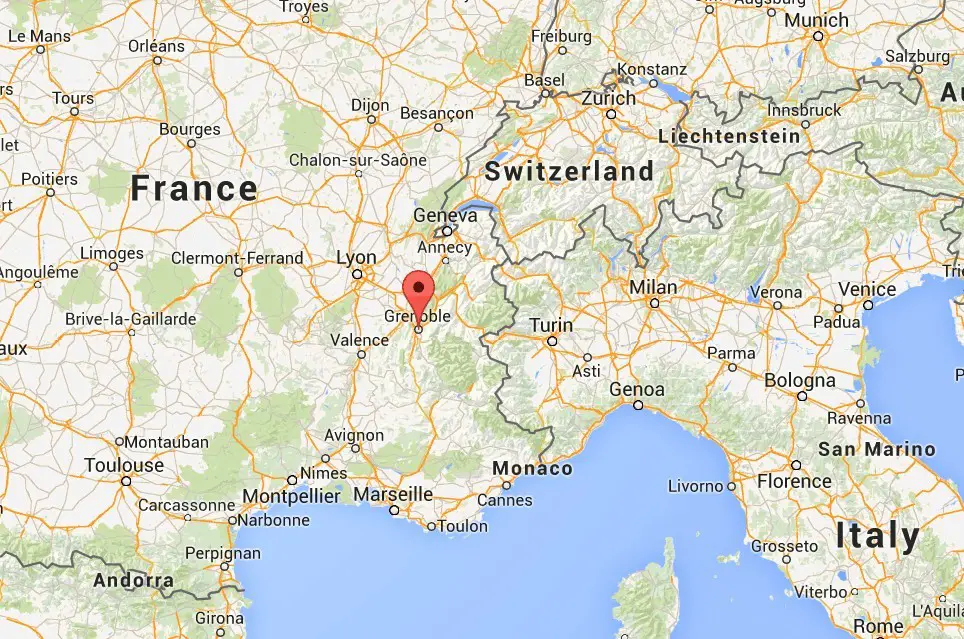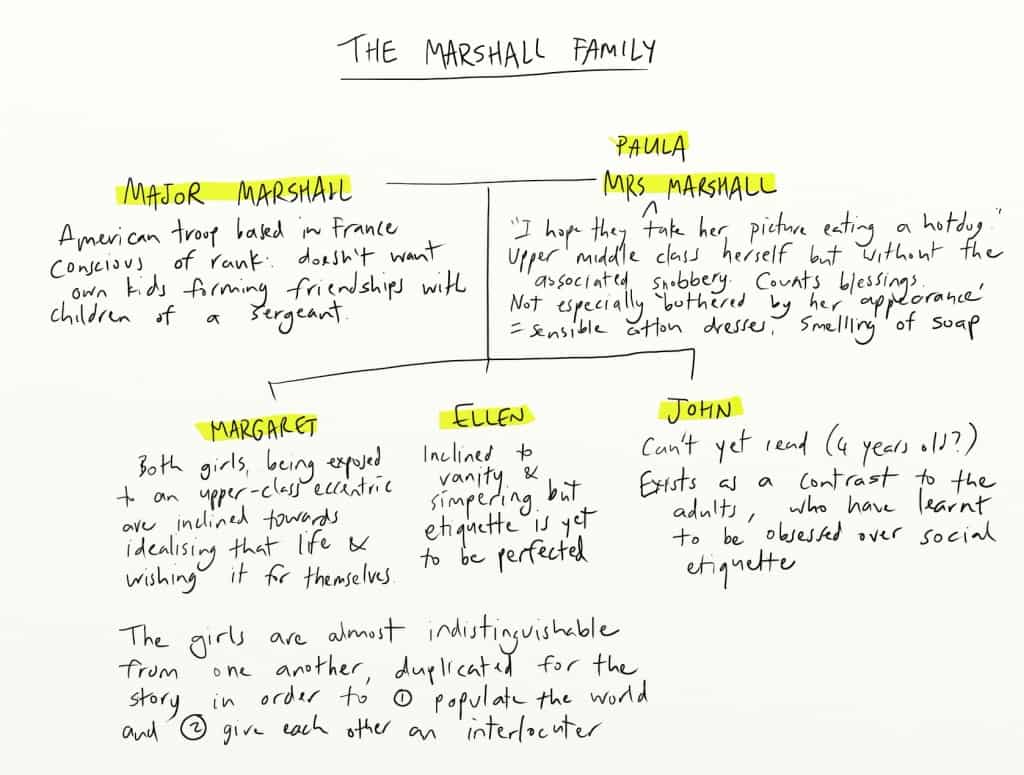The Picnic by Mavis Gallant is darkly comic, a ‘comedy of manners’, starring an eccentric old French aristocratic woman. The reader is afforded a close-up view into her life via an American family, the Marshalls, Major Marshall being stationed in France after the war.
The Comedy of Manners is an entertainment form which satirizes the manners and affectations of a social class or of multiple classes, often represented by stereotypical stock characters.
Wikipedia
PLOT
The plot concerns recent backstory of Madame Pégurin, as a backdrop to the immediate plot, which concerns the Marshall family preparing for a small, inconsequential picnic which has been contrived to foster American-Franco relations in the village. The whole affair has been suggested by a prominent American magazine. (Are we to assume National Geographic?)
SETTING OF THE PICNIC
Published in 1952, this story is also set around that time, when WW2 is fresh in everyone’s mind. The recent history of a world war is significant, and the very reason for the story. The town of ‘Virolun’ seems to be a fictional settlement in France, adjacent to American army barracks. Though we are told that it’s near Grenoble and The Alps.

This is a tidy town with tiled roofs. Ironically, the Marshalls searched and searched for a typically French town and found only five. Which suggests that their idea of a ‘typically French town’ is not actually very French at all.
CHARACTER

The most memorable and well-drawn character of this story is of course Madame Pégurin, reminscent of The Dowager Countess of Downton Abbey or of Gosford‘s Constance, Dowager Countess of Trentham (both played by Dame Maggie Smith). This is the trope of the Grande Dame:
The trope is nearly always a Comedy Trope, associated particularly with the Comedy of Manners; as such, it serves as a useful device for mocking social pretensions, and dates back to the ancient Roman plays of Plautus and Terence, where the Grande Dame appeared as the Matrona.
Madame Pégurin is also a Deadpan Snarker (A character given to gnomic, sarcastic, sometimes bitter, occasionally whimsical asides):
“And how is your mother? Does she still have so very much trouble with the vegetables?”
The Deadpan Snarker often exists to point out the ridiculous of a social situation, but in this particular archetype, is also not self-aware of her very own contradictory attitudes. Madame Pégurin throws out The Goulds because of a ridiculous argument which started (comically) with a head of cabbage which Mrs Gould had thrown in the bin owing to its going rotten. Despite Madame Pégurin’s own ostentatious displays of wealth, she off-loads any socialist responsibility by telling Mrs Gould, wife of a mere sergeant, that there are people in France who are starving, and so Mrs Gould should be feeding her family the rotting cauliflower regardless.
[Madame Pégurin] had asked General Wirtworth to tea, and he had finished off a bottle of whiskey she had been saving for eleven years. He had then been moved to kiss her hand, but that could not make up for her sense of loss.
Despite her wealth, of great magnitude in relation to almost everyone else, Madame Pégurin nevertheless feels a pang of loss when a material item comes to its end. This is a woman whose own children are estranged, having married ‘beneath’ their station, according to Madame, so the old woman’s sense of loss is channeled towards lesser things.
See the McSweeney’s article Confessions of a Closeted One-percenter for an explanation of how such cognitive dissonance can occur.
THEME
A major theme of this story is underscored in the final sentence:
Reassured, the Major thrust his notes in his pocket and strode from the kitchen to the garden, where, squaring his shoulders, he rallied his forces for the coming big struggle.
But a close reading reveals that this theme has been foreshadowed throughout the story. If the details were changed, this story could be one of army tactics:
The General had repeated this to Colonel Baring, who had passed it on to Major Marshall, who had brought it to rest with his wife. … The mammoth job of organizing the picnic had fallen just where he knew it would—on his own shoulders.
“Just see us through the picnic, old man!”
A photographer has accompanied the magazine not to shoot bullets, but to shoot pictures.
This is a story about archetypes, and how reality fails to live up to our imagined, storybook versions.
It is also a story about the stories we tell ourselves to justify contemptible behaviour towards others. Snobbery, in short.
This is also a story which hints at the ridiculousness of war by comparing its machinations to that of a small village picnic. To this end, Mavis Gallant chose certain details specifically for their comic value:
[The Major’s staff] was composed of but two men: a lieutenant who had developed measles a week before the picnic, and a glowering young sergeant who, the Major feared, would someday write a novel depicting him in an unfavourable light.
Against the recent backdrop of life and death big struggles, the (sometimes serious but usually harmless) affliction of ‘measles’ pales in comparison to gaping wounds and loss of limb. The Major is worried about being ‘depicted in an unfavourable light’ at some point in the hypothetical far future, a worry wholly concocted inside his own head. This wonderful detail manages to tell the reader something about both the Major and about the ‘glowering young sergeant’.
…the American magazine had been joined by photographer who wore openwork sandals and had so far not emerged from the Hotel Bristol.
Le Bristol Paris is a well-known five star hotel which operates even today. Pictures on their website indicate a luxurious experience, and explains why a photographer on a paid jaunt might not want to leave. The detail of the ‘openwork sandals’ is in contrast with the (unmentioned) army boot. A man who wears openwork sandals is not expecting big struggle anytime soon. This man will be shooting photographs, not bullets: ‘Suggest folk dances as further symbol of unity…Object: color shot.’
TECHNIQUES OF NOTE
The humour in this story is notable for its execution.
“And while she’s at it, she’s ruining all my good work.” [Mrs Marshall] often used this expression of the children, as if they were a length of Red Cross knitting.
Comparing the children to something closely linked with war efforts is an especially masterful touch, reminding the readers of the setting (though contemporary readers probably didn’t need reminding).
COMPARE WITH
Margaret Atwood makes much use of the ‘shooting’ metaphor (bullets/photographs) in her novel Surfacing.
Grenfell’s war poem Into Battle opens as if describing a picnic.
Rose Macaulay wrote a war poem called Picnic in 1917, emphasising just how little war is like a picnic.
STORY SPECS
Approx 4500 words
Omniscient point of view, opening with The Marshalls, the Marshall daughters (as they wish to visit Madame Pégurin — the reader’s first introduction to this eccentric character), then on the Major (to explain his problems regarding organising the picnic), back out as a panshot of the Marshall family as a whole, zooming in on the children, shifting scenes to the Major, retreating to include Madame Pégurin etc. The story begins with the children, focuses quite a lot on them, and ends with the Major. The children’s point of view is most interesting as there emerges a gap between what they observe (their admiration of ostentatious wealth) and what the reader concludes (a lonely old eccentric woman with outdated views).
[Madame Pégurin] disliked foreigners; she had told the Marshall children so. But they, fortunately, did not consider themselves foreign, and had pictured dark men with curling beards.
The largely invisible cook and maid, Louise, is also zoomed in on. By including the close third person POV of characters from every social class, the ridiculous concerns of the upper class are contrasted with the practical concerns of Louise, such as rubbing hand marks off the wall with bread.
This story can be found in The Cost Of Living: Early and uncollected stories by Mavis Gallant
WRITE YOUR OWN
Have you ever known in-real-life an eccentric character such as Madame Pégurin, or like any eccentric archetype from stories you have read/watched? Did you change at all for the knowing?
Have you ever been involved in an event which seemed so very important at the time, to the people involved, but looking back was plagued with petty concerns and pecking orders?
Do you have a global concern which has correlations with something in smaller, day-to-day life?
